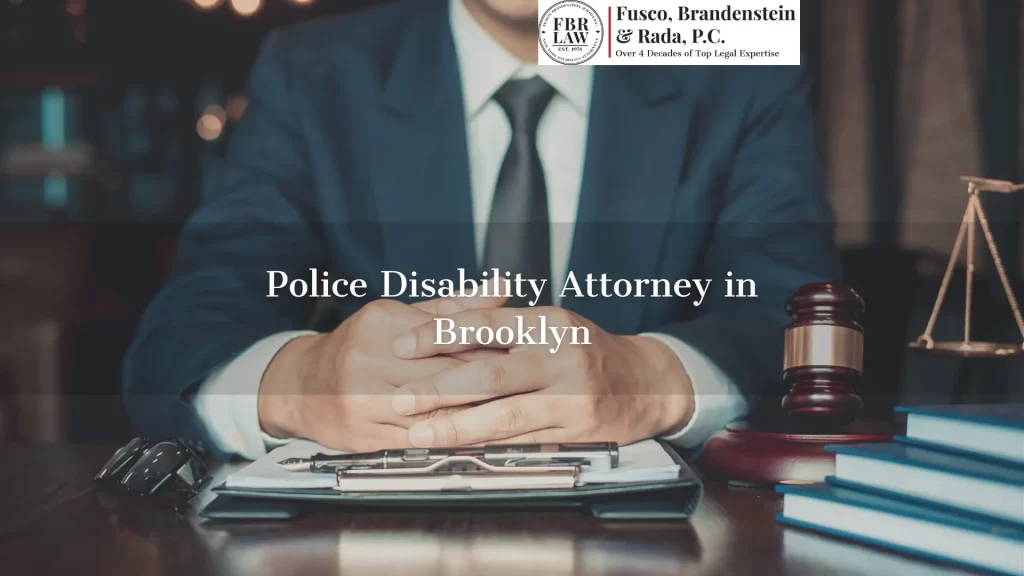
In the line of duty, police officers face serious risks to their safety every day. When these risks result in long-lasting, incapacitating injury, the officer who’s been hurt is owed a fair disability pension. Sadly, the reality of receiving a pension from the state can prove extremely challenging and laborious.
The disability attorneys at Fusco, Brandenstein & Rada, P.C. know how to navigate the complicated retirement system that doles out police disability pensions. We recognize the sacrifices that you have made as a police officer, and with more than 40 years of experience under our belt, we are prepared to fight for you to receive a disability pension.
We offer a free consultation to anyone who needs help or wants to learn more about our services. To schedule yours, call 516-496-0400. We are available to speak with you 24/7.
Do I Need a Police Disability Attorney?
Police officers put their safety on the line every day to serve the public. With that service comes certain benefits to which officers are entitled – including disability pensions. If you are a police officer who has incurred a disability in the course of your duties, you should receive a fair disability pension.
Unfortunately, the NYS Policemen’s and Firemen’s Retirement System (NYSPFRS) is not as generous as one would hope when it comes to providing disability pensions to police officers. The system imposes stringent requirements on officers seeking a pension. Because of these requirements, which include extensive evidence and strict filing deadlines, proving your eligibility to the state can be a complicated chore.
An experienced police disability attorney can ensure that you meet all deadlines, submit a detailed accident report, and provide compelling evidence to the state. This will give you your best shot of receiving a just disability pension after the service you’ve provided.
Why Choose Fusco, Brandenstein & Rada, P.C. to Handle My Case?
 Fusco, Brandenstein & Rada, P.C. has served New York state residents seeking workers’ compensation and disability pensions for more than four decades. Since our firm’s founding in 1978, our team of Brooklyn attorneys has aggressively fought for many clients to receive police disability pensions. We know how much police officers have given to our community, and we will fight our hardest to secure the pension you deserve.
Fusco, Brandenstein & Rada, P.C. has served New York state residents seeking workers’ compensation and disability pensions for more than four decades. Since our firm’s founding in 1978, our team of Brooklyn attorneys has aggressively fought for many clients to receive police disability pensions. We know how much police officers have given to our community, and we will fight our hardest to secure the pension you deserve.
When you choose to work with Fusco, Brandenstein & Rada, P.C., you will discover how deeply we value customer satisfaction. We treat each client as a neighbor and friend and handle each unique case with both skill and compassion. To pursue your pension while allowing you space to heal, we will create an individualized plan that best serves your needs. This starts with the free consultation that we offer to all prospective clients, during which one of our attorneys will analyze your case and talk through your options.
How Will My Disability Pension Be Determined?
As a member of the NYSPFRS, you are entitled to a tax-free disability pension if you have incurred a disability in the line of duty. The pension you receive – if you are able to prove that you have incurred the disability while working – may equal either 50% or 75% of your final average salary. Whether you receive the 50% or 75% pension will depend on the way that you were injured.
To be eligible for the 75% disability pension, you will need to demonstrate that your disability has been caused by an “accident.” This requirement is set forth by the NYS Retirement and Social Security Law – but unfortunately, this law does not define “accident.” As a result, it can be difficult for injured officers to prove to the state that they have suffered a qualifying accident.
Police officers may also be eligible for a 75% disability pension if they have incurred a disability due to the events of September 11, 2001. Under the World Trade Center Bill, officers may receive this pension if they served for a period of time following 9/11 and now suffer from certain qualifying conditions. There is no need to prove an “accident” in these cases since the events and aftermath of 9/11 are presumed to have caused the condition.
If you do not meet the requirements to receive a 75% disability pension, you may still be eligible for a 50% disability pension. To receive the 50% pension, a police officer must have sustained a disability while performing his or her duties. Eligibility for this pension does not hinge on a demonstrable “accident”; instead, an officer must simply have incurred the disability as a result of their service. For instance, a disability that has come on over many years of duty may render an officer eligible for the 50% pension.
Regardless of which pension you believe you deserve, it is important to retain legal counsel to help with your case. Even if you do not need to prove that you have experienced an “accident,” you will need to prove other critical points to the state, such as the existence of a qualifying disability. An attorney can make sure that your accident report, medical evidence, and other files are sufficiently detailed to secure the pension you deserve.
Common Causes of Injury for Police Officers
According to U.S. Bureau of Labor statistics, police officers face an unusually high risk of sustaining serious injuries while on the job. Some of these injuries might lead to a disability for which the injured officer is owed a pension.
Here are some of the most common causes of injuries that police officers suffer:
- Violence by other people: Violent behavior is one of the leading causes of injuries sustained by police officers. Dealing with violence is a risk that officers take on for the good of the public, and when this risk causes them harm, they are owed a fair disability pension.
- Car accidents: Traffic accidents are another cause of many police officers’ injuries. Officers spend a significant amount of time behind the wheel during each shift, and this means they face a substantial risk of vehicle collisions. They may also be hit while they are walking or running to respond to a call.
- Dangerous substances: In some cases, police officers face exposure to harmful substances that can cause long-term damage to their health. For example, an officer may sustain lasting lung damage after spending time in a home with asbestos, or from being exposed to other toxic fumes.
- Slips, trips, and falls: Although slipping and falling may not seem like one of the greatest risks that police officers face, slip-and-fall accidents actually account for a significant number of officers’ injuries. Police officers are very active throughout the workday, which can lead to nasty trips and falls. Sometimes, these falls result in traumatic brain injury, broken bones, or some other long-term disability for which an officer is entitled to a pension.
- Overexertion: The duties that come with being a police officer can often push a person to his or her physical limits. This kind of overexertion can lead to pulled muscles, stress fractures, and more, some of which may develop into a lasting disability down the line.
Contact Fusco, Brandenstein & Rada, P.C.
If you have been hurt in the line of duty and believe you are owed a police disability pension, do not wait to contact a lawyer. By obtaining legal counsel now rather than later, you will maximize your chances of securing the pension you deserve.
The police disability attorneys at Fusco, Brandenstein & Rada, P.C. are prepared to help you with your case today. To schedule a free consultation with a member of our team, call 516-496-0400; we are available 24/7 to answer your call.
